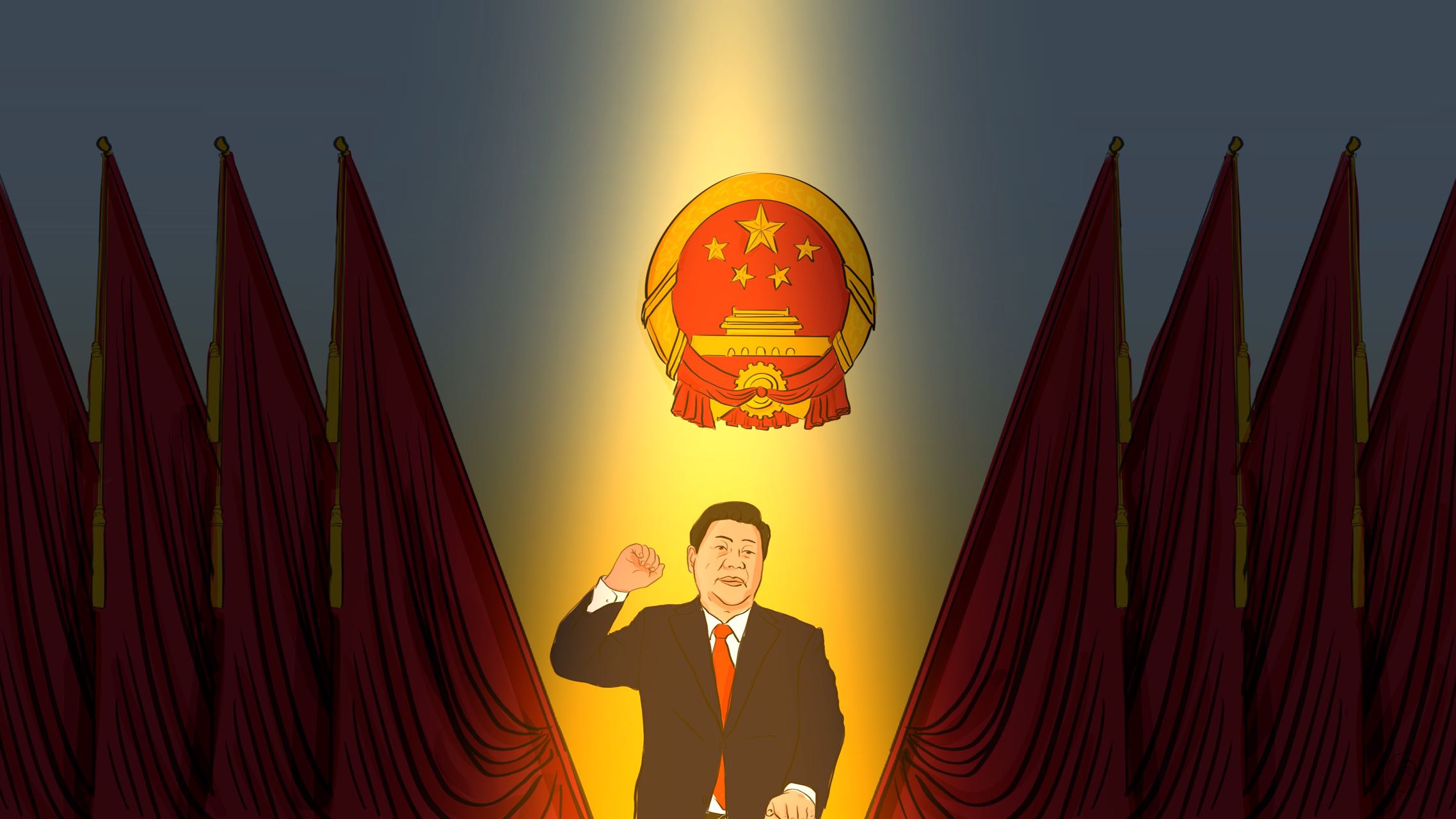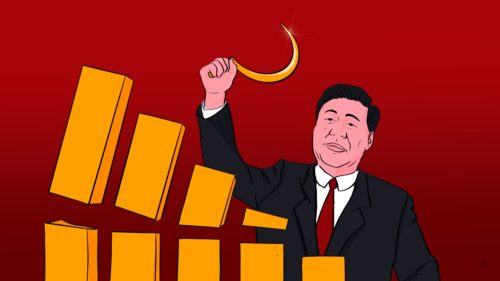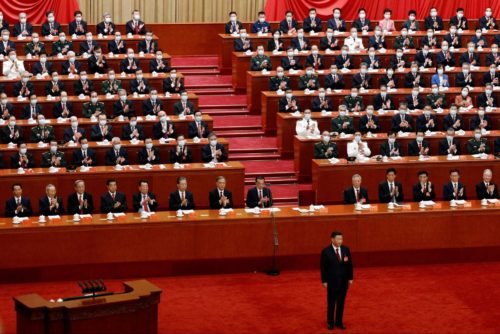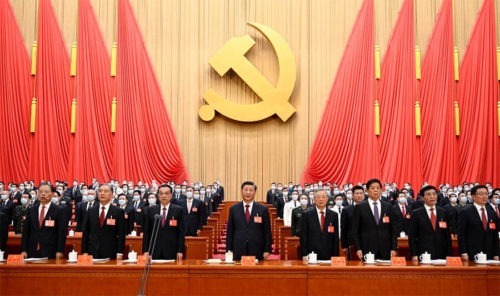20th Party Congress: The view from Beijing
China’s Party elite get ready to meet…not that it matters much to those living down the street.

Beijing is getting ready for a party this week, only without any fanfare. In fact, whatever the opposite of fanfare is, considering the tightened travel restrictions amid omnipresent fears of COVID and the suspension of large gatherings. Only one Party is allowed.
The 20th National Congress of the Chinese Communist Party convenes on October 16. Approximately 2,300 delegates from all over China representing the estimated 97 million members of the Chinese Communist Party (CCP) will meet at the Great Hall of the People. Xí Jìnpíng 习近平 is expected to receive a third term (and maybe a title bump) as the leader of the world’s largest political party, and the Congress will endorse new terms for the 370 members of the Central Committee, the 25 people who make up the Politburo, and the seven — Xi plus six others (likely all men*) — who will form the apex of Chinese political establishment, the Politburo Standing Committee. Attention must be paid to the top, but most of those in attendance will be rather anonymous low- to mid-ranked members chosen from different party branches across the county. A handful of famous faces — athletes, performers, journalists — may provide a bit of glamor, though this is a bit like adding a pinch of paprika and salt to flavor a soup made from wallpaper paste.
* For the 19th Party Congress convened in 2017, roughly 5% of full members and 11.6% of alternate members were women. Only one woman — Sūn Chūnlán 孙春兰 — is part of the Politburo, and no woman has ever served on the Standing Committee.
Personnel decisions will have been previously negotiated through weeks and months of backroom horse-trading and informal politicking. Consider the Party Congress itself a show of legitimatization by choreography. The assembled delegates will voice their full-throated endorsement to a series of Party platforms, including China’s political direction and economic agenda for the next five years, similarly worked out in advance. While the Party Congress began as a decision-making body, debate and discussion among delegates, as has long been the case with those attending the annual “Two Sessions” of the National People’s Congress and Chinese People’s Political Consultative Conference in March, will be relegated to topics like “How much hair dye is too much?” and “How enthusiastically shall we clap when told to?”
The Two Sessions and the Party Congress both feature large gatherings of delegates packed in the Great Hall of the People, but represent different aspects of the Chinese political system. The Two Sessions features the highest body in the Chinese government. Next week’s gathering in Beijing is a party for the Party. (Here’s a primer on the difference.)
In the most general terms, and using a crude biological analogy, if China is like the human body, then the government represents the circulatory system, while the Party is the nervous system. The circulatory and nervous systems overlap throughout much of our anatomy but perform different roles. The nervous system tells the body what to do, and the circulatory system provides the means by which the body can function.
The Party extends to the grassroots levels; most schools, companies, and organizations have their Party branch and overlaps with the structures and units of the government and other official organs. The Party calls the shots, and the government and its organs carry out the directives.
The issue, at least recently, has been the metastasizing of the Party, such that the nervous system threatens to overwhelm the body with signals, making it difficult for the circulatory system to maintain the kind of regularity necessary for an organism to stay in good health. Or, to put it another way, the Party has, of late, become a great, big bundle of nerves.
Consider the Party Congress a show of legitimatization by choreography.
A few people I’ve talked to have concerns about a few thousand people flying into Beijing from all over the country, including several provinces with (by China standards) serious COVID outbreaks — but mostly only shrug when it comes to the outcomes of the upcoming Congress. There’s always a certain amount of political scuttlebutt floating around Beijing, but for the most part, people here are more interested in whether or not their neighbor (read: me) has COVID, been identified by Big Data as having been recently COVID-adjacent, or has done anything else that might result in the entire building being put under a lockdown — or, as we are instructed to call it, “static management,” a term that sounds less like enforced quarantine and more like a problem solved with the right fabric softener.
Whatever the worries about the influx of Partiers, I suspect the delegates will be tested many times before they touch down in the capital. Residents in Beijing are required to have an oversized Q-tip inserted into their mouth every 72 hours, as well as multiple times within 48 hours if they have recently entered from another part of China. I think it’s safe to assume that the delegates will be a well-swabbed bunch. Nobody wants the Party’s biggest party to become a super-spreader event. Many cities and provinces have also tightened their COVID protocols in recent weeks. Part of this is in response to a recent surge in cases, although the total number is still minuscule compared to most other countries. But one of the important rules of Party Congresses is that in the weeks leading up to it, all news must follow the script of: “All under Heaven is Good. The leaders are wise. The rest of the world is an apocalyptic wasteland. Now clap.”
The 20th Congress is also important historically, not just because of the continued rule of Xi Jinping and enshrinement of his policies, but because it is the round number 20. You might think this makes sense since the Party Congress meets every five years, and the CCP celebrated its centennial last year. In fact, the custom of congressing every five years began in 1982; prior to that, the Party Congresses had an…irregular schedule governed by what historians in the PRC euphemistically refer to as the “vicissitudes of the time.”
The Party met six times in its first seven years of existence, including once in Moscow, and then didn’t meet from 1928 until 1945. There were only three Party Congresses convened in the Mao era, once in the 1950s, and then in dramatic fashion — the 9th Party Congress — in 1969 at the height of the Cultural Revolution. The Congress met again in 1973 (RIP Lín Biāo 林彪) and, post-Mao, in 1977 with Huá Guófēng 华国锋 presiding, the last person to receive the “leader” title, even though nobody in China under the age of 40 has any idea who Hua is anymore.
By contrast, the 20th Congress will be a celebration of China’s achievements, a made-for-CCTV spectacle with as much fanfare and hoopla as the notoriously hoopla-averse leadership will allow. Whether or not the delegates have any say in actual Party policy or personnel decisions is irrelevant; it’s the ritual that matters. Taking part in the Congress is political currency that can be cashed in for all kinds of perks, powers, and career enhancements for the next five years. For the top leaders, taking the stage as thousands of delegates applaud rapturously in unison conveys legitimacy on a process that is far from transparent.
There will be a lot of predictions and prognostications about the who and what and the what’s next of the 20th Party Congress. I will leave that kind of speculation to those China pundits tapping on their keyboards 6,000 miles away, because they are just as close to seeing the center of the action as I am, even though I am in Beijing. In the imperial era, the most important rituals were done for the benefit of the elite; they were not public performances. As the emperor traveled back and forth from his palace to whatever altar was being venerated that day, heralds and guards would clear the streets lest the people catch a glimpse of the sovereign.
Likewise, I won’t be attending the Congress, but then neither will anyone else — save for some lucky (unlucky?) foreign correspondents — I know in Beijing. There won’t be a parade or spontaneous mass gathering. The roads and sidewalks around Tiananmen Square will be under tight restrictions.
We in Beijing will be expected to sit at home and watch packaged reports sent to our phones or to tune into identical news programs broadcast every evening on almost every single channel. The message will be clear and unimpeded by nuance, alternative perspectives, or critical analysis: All under Heaven is Good. The Leaders are Wise. As seen on TV.






